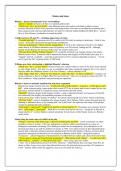Status and class
Blanche – status is incongruous to her surroundings
- “gloves”, “pearls”, dressed as if there is a summer garden party
- “Which way - do I - go now Stella”, when Blanche comes into contact with black vendor in streets,
becomes flustered as hasn't been exposed to such things before: first time we see Blanche something other
than composed and coherent, implying she's not open to a lifestyle unlike childhood in Belle Reve – doesn’t
fit in in New Orleans, foreshadows eventual downfall
Conflict between OS and NS – declining importance of status
- ”Crumble and fade”, B represents the OS in conflict with NS which is starting to deteriorate = birth of new
society - physically represented through Stanley and Blanche
- 'I have an acquaintance', 'I have a lawyer acquaintance', S wants to give impression that he is of a higher
status than he is (Williams introduces sense of hypocrisy over NS secretly valuing the OS – although
Stanley mocks Blanche for showing off her class, he secretly wants it too
- “Pull you down off them [white] columns”, N.S. is spiteful and harsh (e.g. Stanley buying a bus ticket),
Blanche means white: Tennessee said he admired the beauty and elegance of Old South, hence play is a
“tragedy” and N.S. is spiteful – somewhat controversial as O.S’s economy depended on slavery – “I write
out of regret for that” meaning beauty of Old South
Williams uses their relationship to highlight Blanche’s classism
- “which way – do I – go now Stella”, flustered when sees a black vendor in street as she hasn’t been exposed
to such things before– first time we see as something other than composed (suggests she is not open to
lifestyle unlike her childhood, doesn’t fit in New Orleans) – reflects classism of OS
- “Only Edgar Allan Poe”, “what are you doing in a place like this” “in these conditions”. Compares her
living conditions to that of an Edgar Allan Poe novel and says “what are you doing in a place like this” “in
these conditions” being hyperbolic and presenting her superiority
Blanche’s desire to maintain sophisticated and classy reputation
- Blanche has image of purity and class “a white suit with a fluffy bodice […] pearls […] white gloves and a
hat” – white connotes purity, name means white woods YET she is chaotic and twisted, warped by her own
grievances, shrouds herself in a façade by means of protection and hide reality
- “Butterfly” (fantasy) despite moth imagery (reality) – aims to glamorise herself, craving grace of butterfly
but realistically has fragility and impending exposure of the moth
- Upon arrival, pours “half a tumbler of whiskey” for herself, then pretends not to know where to find them:
‘Oh I spy! I spy!’ - aims to strengthen false image of purity (New Orleans 1940s, women frowned upon for
drinking or immodest dress, so by claiming that ‘one’s [her] limit’ she replicates this image of the perfect
woman by adopting this false modesty)
- “grim reaper”, “graveyard”, “fought for it, bled for it, almost died for it”, Monologue uses semantic field of
death: “grim reaper”, “graveyard” – Belle Reve is a basic need for her survival – “fought for it, bled for it,
almost died for it”: mirrors Stanley’s primal animalistic lexical choice (while Stanley needs sex, Blanche
needs status)
Status being the main cause of conflict in the play
- “Polack”, “survivor of the Stone Age”, “they are something like the Irish” - social commentary on ethnic
prejudice at time of writing – USA saw immigrants as inferior within social hierarchy as a sense of
immigrant communities swarming USA diluting its culture due to immigration+ low-paid labour so OS
frowned upon this as up until the abolition of slavery in 1865, were rather resistant to this industrialisation -
general lack of tolerance among Americans, heightened by the fact that Stanley is likely a second or third
generation immigrant and therefore just as American as Blanche and/or Stella - changed his name to
“Tennessee” – acknowledgement of dramatization of conflict between culture and values of his native land
- “’Every man is a king and I am the king around here”, “Blue denim work clothes” v “a white suit with a
fluffy bodice […] pearls […] white gloves and a hat” – Huey Long, share our wealth
- v class - ties to industrialism, proud to be 100% American – while Blanche draws on Edgar Allan Poe, he
draws on Huey Long, every man a king (abused his powers for personal gain as governor of Louisiana in
1929) – Stanley follows after this aggressive man as a role model for America




